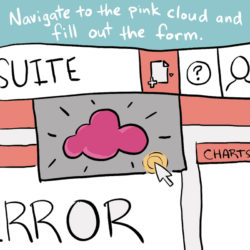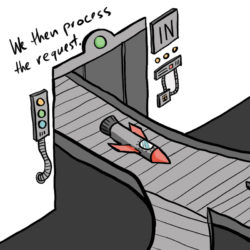In this blog post, we will talk about NetSuite ERP and its perks.
ERP stands for Enterprise Resource Planning, a category of software that helps businesses manage their various resources. In the most basic sense, ERP software integrates all of a company’s essential functions (accounting, sales, logistics, etc.) into one system.
However, not every ERP solution is the same. So, what is NetSuite ERP? And why should you consider using it for your business?
What Is NetSuite ERP?
NetSuite ERP is an incredibly versatile and effective cloud business management solution that helps organizations automate core processes. It also provides real-time visibility into the data and performance of the entire company.
NetSuite was one of the first ERP providers to offer a complete, cloud-based solution. And today, NetSuite is still the leader in cloud ERP software solutions.
PREVIOUS POST — NetSuite Consultant: Why You Need One for Your Business
NetSuite ERP consolidates vital business processes across finance, order management, inventory, shipping, and billing onto a single platform, eliminating the need for multiple disparate systems. NetSuite ERP also provides real-time analytics and reporting to give organizations visibility into their business performance.
This allows organizations to identify issues early and take corrective action to improve operational efficiency and profitability. NetSuite ERP is a powerful solution that can help organizations streamline operations, reduce costs, and improve their bottom line.
Features of NetSuite ERP
NetSuite’s enterprise resource planning (ERP) system offers a comprehensive suite of features to help businesses streamline their operations.
NetSuite includes financials, inventory, order management, CRM, and eCommerce functionality in a single, unified platform. This eliminates the need for businesses to maintain separate systems for each of these different functions.
Here are some features of NetSuite ERP:
Accounting Software
NetSuite accounting software is a cloud-based solution that offers a complete view of your financial performance.
With NetSuite, you can transform your general ledger, automate accounts payable, optimize accounts receivable, and streamline tax management. NetSuite also provides real-time visibility into cash flow and financial statements.
In addition, NetSuite integrates with your existing business applications, making it easy to get started and scale as your business grows. With NetSuite, you can get the complete picture of your business finances in one place.
Global Business Management
Global business management has never been more critical—or more complex. NetSuite ERP provides a NetSuite OneWorld account with which companies can manage their global operations more effectively, reducing costs and increasing efficiency.
OneWorld provides a unified platform for managing taxation regulations, multiple currencies, and reporting requirements across geographies and subsidiaries. And because it is based in the cloud, OneWorld provides real-time financial consolidation and visibility so that you can make informed decisions quickly and easily.
With NetSuite OneWorld, global business management is simpler and more efficient—and your company will be better positioned to compete in today’s increasingly global economy.
NetSuite Financial Management
NetSuite Financial Management is a powerful financial tool that can help businesses of all sizes manage their finances more efficiently and effectively.
Companies can save time and money by automating daily financial transactions and accelerating the immediate financial process while ensuring compliance with regulatory requirements.
RELATED POST — NetSuite SuiteSuccess: Accelerate Your Company’s Growth
With its real-time view of business financial performance, NetSuite Financial Management provides valuable insights that can help organizations make better-informed decisions about their business operations.
Whether a small business owner or a large corporation, NetSuite Financial Management can help you improve your bottom line.
Order Management
Order management can be complex and error-prone, primarily relying on manual methods.
NetSuite’s order management software streamlines the entire process, from quote to fulfillment, helping to eliminate bottlenecks and prevent errors. This results in invoicing and payment happening promptly, as well as improved customer satisfaction.
In addition, NetSuite’s order management software integrates with your existing financial and CRM systems, providing a seamless experience for your staff and customers.
Supply Chain Management
NetSuite’s Supply Chain Management (SCM) is designed to streamline the process of transporting items or materials through a supply chain.
SCM provides a centralized view of inventory levels, order histories, and customer demand across all locations. This visibility enables businesses to make more informed decisions about production schedules, stock levels, and transportation routes.
In addition, NetSuite’s SCM module includes powerful tools for managing supplier relationships and tracking compliance with customs regulations. As a result, businesses can confidently manage their supply chains from end to end with NetSuite.
Inventory Management
Too much inventory ties up working capital and can lead to obsolescence, while too little will result in stock-outs and lost sales.
In either case, large organizations that are bleeding cash due to incorrect inventory management practices will struggle to stay afloat in today’s business climate. NetSuite ERP provides inventory management tools that provide real-time visibility to avoid these pitfalls.
RECOMMENDED POST — Work Remotely and Travel the World: The Perks of Being a Freelancer
Automating inventory management across multiple locations allows businesses to keep costs low while simultaneously meeting customer delivery expectations.
NetSuite’s replenishment and safety stock optimization features enable organizations to make informed decisions about when and how much inventory to keep on hand, ensuring that they are never caught short-handed – or holding too much excess stock.
Warehouse Management
The NetSuite Warehouse Management System (WMS) is a cloud-based solution that helps businesses optimize their warehouse operations. NetSuite WMS provides real-time visibility into inventory levels, stock locations, and order status.
This visibility enables companies to make more informed decisions about production schedules, stock levels, and transportation routes.
NetSuite Warehouse Management
NetSuite’s Warehouse Management solution is designed to streamline your warehouse operations and improve efficiency.
With RF-device-directed putaway and picking tasks, you can customize your warehouse process to ensure that orders are fulfilled accurately and efficiently.
NEXT POST — OdeCloud’s Primary Community Goal: Growing Together in NetSuite
Additionally, NetSuite’s advanced capabilities, like wave management, cartonization, and cycle count planning, make it easy to keep track of inventory levels and shipping schedules.
And with real-time inventory updates and shipping system integrations, you can be confident that your warehouse is running smoothly.
Benefits of NetSuite ERP
From automating financial processes and gaining inventory visibility to supply chain optimization and increasing warehouse efficiency, NetSuite ERP can help your business run more smoothly and effectively.
Let’s take a closer look at some of the key benefits of NetSuite ERP.
Automate Financial Processes
One of the main benefits of NetSuite ERP is that it can automate many of your financial processes, including accounting, invoicing, and expense management.
This can free up time for your finance team to focus on more strategic tasks, such as financial analysis and planning.
And because NetSuite integrates with your existing financial systems, such as QuickBooks and SAP, you’ll be able to streamline your financial operations even further.
Improve Inventory Visibility
Another benefit of NetSuite ERP is that it gives you real-time visibility into your inventory levels.
With this information at your fingertips, you’ll be able to make more informed decisions about inventory management, such as when to order new products and how much safety stock to maintain.
This improved visibility can also help you avoid stock-outs and reduce carrying costs.
Supply Chain Optimization
NetSuite ERP can also help you optimize your supply chain.
By integrating with your existing systems, such as Salesforce and Shopify, NetSuite can give you visibility into every stage of the supply chain—from suppliers to customers—so you can manage the flow of goods more effectively.
This improved visibility can help you avoid delays and disruptions while reducing costs.
PREVIOUS POST — NetSuite Accounting: Simplify Your Financial Reporting
Efficient Order Management
Another benefit of NetSuite ERP is that it provides flawless order management. With NetSuite’s built-in order management system, you can error-proof your orders from procurement through fulfillment.
And because NetSuite integrates with leading eCommerce platforms, such as Magento and eBay, you’ll be able to manage your orders seamlessly—whether they’re coming in from online or offline channels.
Flexible Reporting and Analytics
NetSuite ERP gives you the flexible reporting and analytics tools you need to make better decisions about your business.
With NetSuite’s customizable reports and dashboards, you’ll be able to track all the critical indicators of your business—from financial performance to inventory levels—in one place.
And with NetSuite’s advanced analytical tools, you’ll be able to drill down into your data to uncover hidden trends and insights.
Improved Customer Service
Finally, NetSuite ERP can help you improve your customer service. With NetSuite’s CRM module, you’ll be able to manage your customer relationships more effectively.
And with NetSuite’s customer service tools, you’ll be able to provide your customers with the fast and efficient service they expect.
Effortlessly Increase Warehouse Efficiency
Last but not least, NetSuite ERP can help you increase warehouse efficiency.
By optimizing the putaway process and reducing picking errors, NetSuite can help you streamline your warehouse operations—leading to shorter lead times and higher customer satisfaction rates.
How Can NetSuite Help Your Business Overcome Common Challenges?
We’ll look at some of the most common business challenges that NetSuite can help you overcome.
Manual Processes
One of the most significant advantages of NetSuite is that it automates manual processes.
If your business still uses paper-based or Excel-based systems, you know how time-consuming and error-prone they can be. NetSuite can automate all your back-office processes—including invoicing, billing, and shipping—to focus on more important things.
Data Accessibility
Another common challenge is data accessibility. When your data is spread out across different silos—such as QuickBooks, Salesforce, Excel spreadsheets, and so on—it can be difficult (if not impossible) to get a clear picture of what’s happening in your business.
With NetSuite, all your data is stored in one central repository, so you can quickly and easily access the information you need when you need it.
RELATED POST — What is a NetSuite Developer?
Data Integrity
Data integrity is another issue that plagues many businesses.
When data isn’t properly tracked or updated on time, it leads to inaccurate financial statements, inventory reports, and other critical data sets. This can cause problems when trying to make informed decisions about your business.
With NetSuite’s real-time data capabilities, you can be confident that the information you’re looking at is always accurate and up-to-date.
Meeting Customer Expectations
Meeting customer expectations is a challenge for any business—but it’s challenging if you don’t have visibility into your operations.
With NetSuite, you can track every aspect of your business in real-time—from orders and inventory to delivery times and cost savings—so you can always meet (or exceed) your customers’ expectations.
Balancing Demand and Supply
The final challenge we’ll discuss is balancing supply and demand. In today’s rapidly changing world, businesses must be able to adapt quickly to new market conditions.
With NetSuite’s supply chain management capabilities, you can manage your inventory levels in real-time, so you always have the right products in stock—without tying up too much capital in inventory.
How Much Does NetSuite ERP Cost?
If you’re looking for a more efficient way to run your business but are worried about the cost, don’t worry–you’re not alone. Numerous companies of all sizes have made the switch to NetSuite.
In this, we’ll give you an overview of NetSuite pricing so you can decide whether it’s the right fit for your business.
How NetSuite Pricing Works?
Users subscribe to NetSuite for an annual license fee. There are three main components to your license: the core platform, the number of users, and optional modules.
There is also a one-time implementation fee for the initial setup. The great thing about the NetSuite cloud software is that you can easily add new features and users as your business expands.
Core Platform + Optional Modules
The core platform includes all the essential functionality you need to run your business, such as financials, inventory, order management, and CRM.
Depending on your specific business needs, you can add optional modules like eCommerce, manufacturing, or project management. The price of each module will vary depending on which one you choose.
RECOMMENDED POST — NetSuite CRM – Powering Customer Relationships
Number of Users
Your license fee will also be based on the number of users accessing NetSuite. Each user will need their login, but remember that you don’t have to assign a license to every employee in your company.
For example, if you have 100 employees but only 50 need access to NetSuite, you would only be paying for 50 licenses.
Implementation Fee
A one-time implementation fee for setting up NetSuite is typically charged by the hour. This fee covers the cost of customizing NetSuite to fit your business needs and training your employees on how to use the software.
The implementation fee can vary widely depending on the size and complexity of your business, so it’s important to discuss this with your implementation partner beforehand.
Is NetSuite Worth It?
Now that you know more about NetSuite pricing, you might wonder if it’s worth it for your business. The answer is that it depends! If you’re looking for a comprehensive solution to grow your business, then NetSuite is worth considering.
It’s essential to keep in mind, however, that there is a significant upfront investment required in both time and money. Be sure to do your research and speak with an OdeCloud expert before making a final decision.
Conclusion
If you’re looking for a comprehensive ERP solution that will grow your business, NetSuite is a great option. It’s easy to use, integrates well with other applications, and scales up as your company grows.
Contact OdeCloud today if you want to learn more about how NetSuite can help streamline your operations and boost your bottom line.










